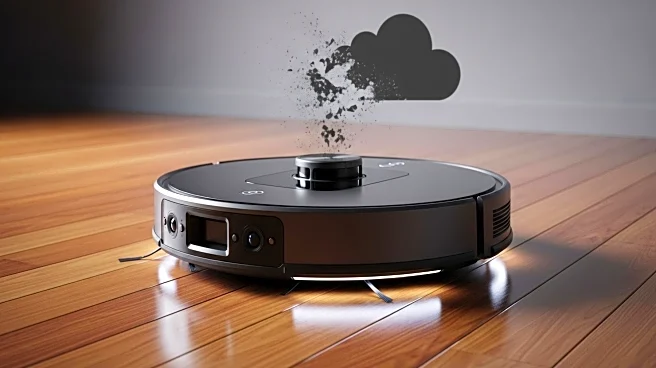What's Happening?
At the IFA 2025 event, Ecovacs unveiled its latest robot vacuum, the Deebot X11 OmniCyclone, which features advanced local AI capabilities. This development marks a shift from cloud-dependent functionalities to more on-device processing. The Deebot X11 OmniCyclone is designed to identify spills and messes autonomously and adjust its cleaning schedule based on user habits. The AI, named Yika, allows users to issue natural-language commands, such as scheduling specific cleaning tasks. However, some features, like the generative AI voice assistant, still rely on cloud connectivity. In the event of an internet outage, the vacuum can continue to operate using its onboard AI, although some functionalities, like remote control via the app, would be unavailable.
Why It's Important?
The introduction of local AI in robot vacuums represents a significant advancement in smart home technology. By reducing reliance on cloud services, these devices can offer enhanced privacy and reliability, as they are less susceptible to internet disruptions. This move could set a precedent for other smart home devices, encouraging manufacturers to develop more autonomous systems. Consumers may benefit from improved performance and potentially lower data privacy concerns. However, the success of this technology depends on its ability to perform as promised without cloud support, which remains a critical factor for user adoption.
What's Next?
Ecovacs may continue to refine its local AI technology, potentially expanding its capabilities to include more on-device features, such as a fully independent AI voice assistant. The company might also explore partnerships or collaborations to enhance the AI's learning algorithms. As the technology matures, other manufacturers could follow suit, leading to a broader industry trend towards local AI solutions. Consumer feedback and market performance will likely influence the pace and direction of these developments.
Beyond the Headlines
The shift towards local AI in smart home devices raises important questions about data privacy and security. By minimizing cloud interactions, companies can offer more secure products, which could appeal to privacy-conscious consumers. Additionally, this trend might influence regulatory discussions around data protection in smart home technologies. The long-term implications could include a reevaluation of how data is managed and stored across the industry.









